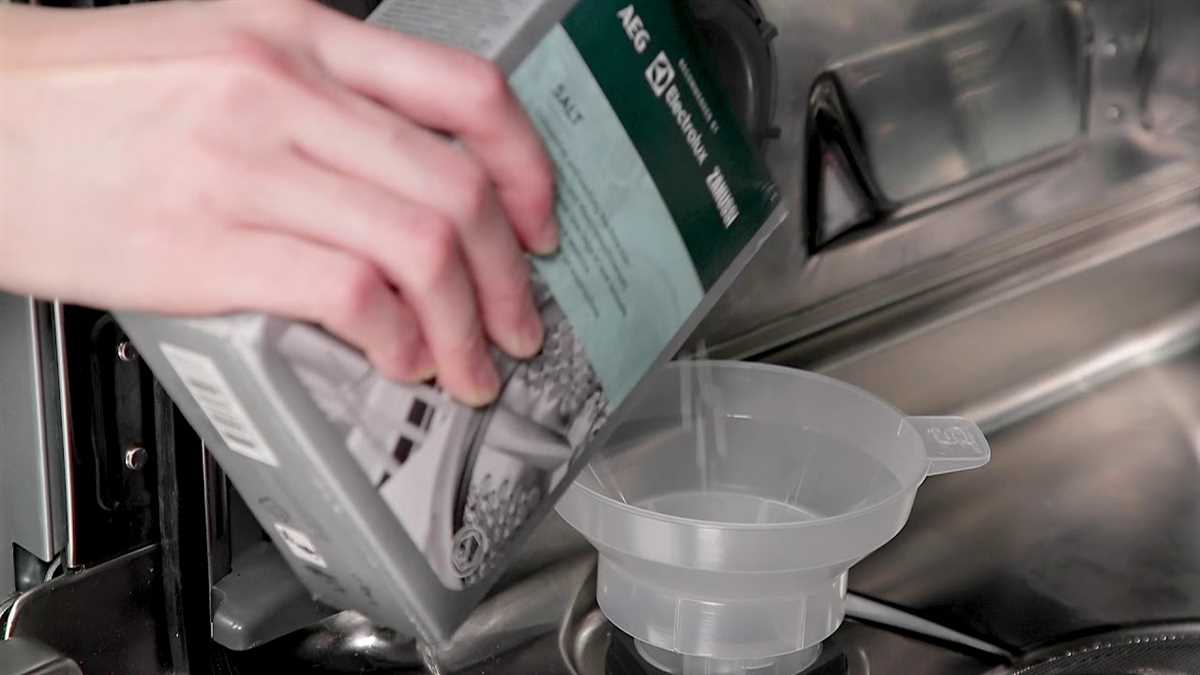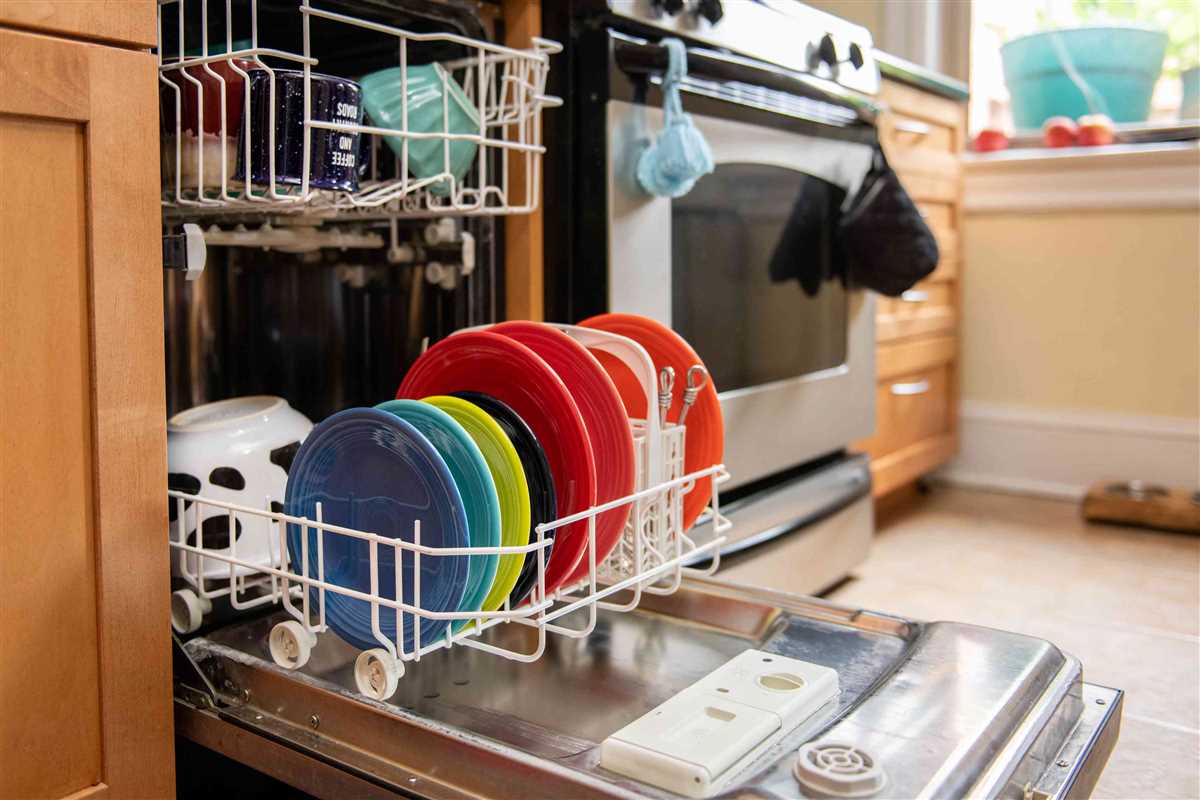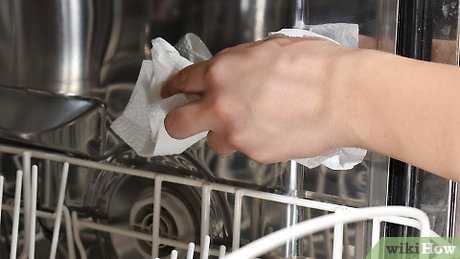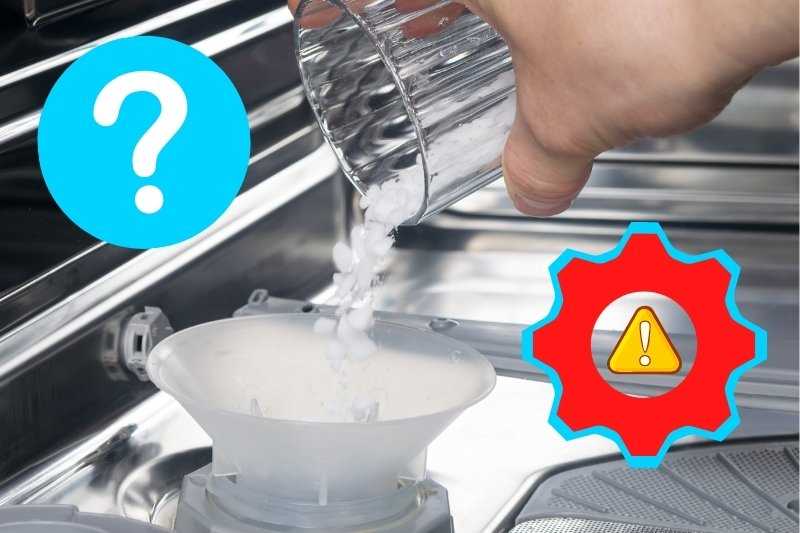


If your dishwasher is using too much salt, it can become a frustrating problem to deal with. In order to keep your dishwasher in good working order, it is important to understand the reasons why it may be using excessive amounts of salt. One of the common causes is a malfunctioning water softener system, where the salt is not being used efficiently to soften the water.
One of the first things to check is whether the dishwasher is set to the correct water hardness level. You can find this information in the user manual or on the manufacturer’s website. If the setting is too high, your dishwasher will use more salt than necessary. On the other hand, if the setting is too low, the water may not be properly softened, leading to a buildup of limescale on your dishes and appliances.
Another possible cause of excessive salt usage is a clogged or malfunctioning salt dispenser. Over time, salt can become clumped together and block the dispenser from properly releasing salt into the water. Additionally, the dispenser may be damaged or worn, preventing it from functioning correctly. In some cases, the problem may be as simple as a loose or broken connection between the dispenser and the dishwasher.
To determine if your dishwasher’s salt dispenser is the culprit, you can try emptying the salt compartment and giving it a thorough clean. Remove any blockages or clumps of salt and ensure that the dispenser is functioning properly. If you still experience issues with excessive salt usage, it may be necessary to replace the dispenser altogether.
In some cases, the root cause of the problem may be a faulty water softener system or a malfunctioning valve. The water softener system is responsible for removing minerals and impurities from the water, ensuring that your dishes are thoroughly cleaned. If the system is not functioning properly, it may result in hard water flowing through your dishwasher, leading to the need for more salt. Similarly, a faulty valve may cause water to flow too quickly or not at all, affecting the efficiency of the water softener.
If you suspect that your dishwasher’s water softener system or valve is causing the excessive salt usage, it is recommended to seek professional advice. A technician will be able to diagnose the issue and provide the necessary repairs or replacements. In the meantime, you can try using vinegar to descale your dishwasher and improve its cleaning performance. Simply pour a cup of vinegar into the empty dishwasher and run a normal cycle. This can help remove any limescale buildup and improve the functioning of the water softener system.
Overall, dealing with a dishwasher that uses too much salt can be a frustrating experience. By understanding the possible causes and implementing the appropriate solutions, you can keep your dishwasher running smoothly and ensure that your dishes come out sparkling clean every time.
Dishwasher Using Too Much Salt

If your dishwasher is using too much salt, it can be frustrating and costly. There are several causes for this issue, and a few solutions to consider.
Causes

One of the main causes of an overflowing salt dispenser is clogs. Over time, dirt and other debris can build up in the dispenser, preventing it from accurately dispensing the appropriate amount of salt. Additionally, a clogged dispenser can sometimes cause the dishwasher to make noise or potentially damage your dishes.
Another cause could be a malfunctioning salt dispenser. If the dispenser is not functioning properly, it may spray too much salt into the dishwasher, causing an overflow. This can be due to a drainage issue or problems with the dispenser itself.
Additionally, if your dishwasher has a built-in rinse-aid dispenser, using too much rinse-aid can also result in an excess of salt being used. The rinse-aid may mix with the salt and cause it to be dispensed in greater quantities. It is important to use the correct amount of rinse-aid to avoid this issue.
Solutions
If your dishwasher is consistently using too much salt, there are a few steps you can take to troubleshoot and resolve the problem:
- Empty the bottom of the dishwasher and thoroughly clean any dirt or debris that may be causing a clog in the salt dispenser.
- Check the rinse-aid dispenser and ensure that you are using the correct amount. Adjust as necessary.
- Inspect the salt dispenser and make sure it is properly fitted and not leaking. If it doesn’t fit properly or is leaking, it may need to be replaced.
- Clean the drainage pipes and ensure that there are no clogs or blockages.
- If the issue persists, consult the dishwasher’s user manual or seek assistance from a professional dishwasher repair service.
It is also a good idea to regularly clean and maintain your dishwasher to prevent any issues from arising. Wipe down the inner surfaces, including the central reservoir, with a thin mixture of vinegar and water. This can help reset the dishwasher and resolve any issues with overusing salt.
In conclusion, if your dishwasher is using too much salt, it is important to identify the cause and take appropriate action to resolve the issue. By following the suggestions above, you can ensure that your dishwasher functions properly and efficiently, avoiding costly salt overuse and potential damage to your dishes.
Causes and Solutions

Causes:
- Using too much salt: When the dishwasher table program is set too high or the salt dispenser is not set properly, it can result in the dishwasher using too much salt.
- Loose or improper loading: If the dishes are not placed properly in the dishwasher, they may bump or bang into each other during the washing cycle, causing the salt dispenser to release more salt than necessary.
- Wrong installation: Incorrect installation of the dishwasher could lead to high-pitched noises, which may cause the salt dispenser to malfunction or break.
- Worn out or broken parts: If the dishwasher’s salt dispenser or other components are worn out or damaged, it can result in the dishwasher using more salt than normal.
- Clogs or blockages: Clogs in the drainage system or salt dispenser can prevent proper flow and may cause the dishwasher to use excessive salt.
Solutions:
- Check the dishwasher’s user manual for instructions on setting the salt dispenser correctly.
- Make sure to load the dishes properly, avoiding any bumping or banging that may trigger the salt dispenser unnecessarily.
- If the dishwasher is not installed properly, consult a professional engineer to correct the installation and prevent any issues with the salt dispenser.
- Regularly clean and check the dishwasher for any worn-out or broken parts. Replace them if necessary.
- Ensure that there are no clogs or blockages in the drainage system or salt dispenser. Clean or remove any debris that may be causing the problem.
- If you have a dishwasher with a rinse-aid compartment, using a rinse-aid can help improve the dishwasher’s performance and reduce the need for excessive salt.
- Consider using a water softening system to improve the quality of the water used in your dishwasher. This may help reduce the amount of salt needed.
Remember, if you’ve tried all the tips mentioned and your dishwasher still continues to use too much salt, it might be best to contact the brand’s customer service or a professional engineer for further assistance. A specialist can diagnose and fix any underlying issues that may be causing the problem.
Expert Tips

- Check for any visible signs of breaking or clogs in the dishwasher’s salt compartment. Wipe away any excess salt and clean out any clogs to ensure proper salt flow.
- Preventing clogs in the salt compartment can be done by closing the salt compartment properly after every use. If the compartment is not closed tightly, salt may not work its way through the pipes and into the dishwasher.
- Check if the salt you are using contains sodium. If it does not, it may not be able to effectively soften the water in the dishwasher, resulting in excessive salt usage.
- If your dishwasher has a timer that controls the regeneration process, make sure it is set to the usual number of hours. This ensures that the regeneration process occurs at regular intervals and prevents excessive salt usage.
- Check the fuse in your dishwasher. If it is blown or not functioning properly, it may cause the dishwasher to use too much salt.
- Ensure that the hot water supply to your dishwasher is turned on. If the hot water supply is not functioning, it can cause the dishwasher to use more salt than necessary to compensate for the lack of hot water.
- If your dishwasher is older, it may be helpful to manually regenerate it to ensure proper salt usage. Consult the dishwasher’s manual for instructions on how to manually regenerate the dishwasher.
- Check if the white finish on the dishwasher’s salt reservoir is damaged or peeling. If it is, it may be necessary to replace the salt reservoir to prevent salt leakage and excessive salt usage.
- Inspect the dishwasher’s spray arms and filters for any foreign objects or debris. Remove any clogs or blockages to ensure proper water flow and prevent excessive salt usage.
- Ensure that the dishwasher is draining properly. If it is not, it may be necessary to check the drain line for any kinks or blockages that are preventing proper drainage.
- Check the dishwasher’s connection to the water supply. If it is not properly connected, water flow may be restricted, resulting in the dishwasher using too much salt.
- If your dishwasher has a smartdispense system, check if it is working properly. If the system is malfunctioning, it may be causing the dishwasher to use excessive amounts of salt.
- Inspect the dishwasher for any leaks or signs of water pooling. A leaking dishwasher can cause water to be constantly replenished, which can lead to excessive salt usage.
Clogged Dishwasher Rinse-Aid Dispenser
In this article, we will discuss a common issue that dishwasher owners may encounter – a clogged rinse-aid dispenser. A clogged dispenser can prevent the rinse aid from being properly distributed during the dishwashing cycle, leading to poor drying performance and leaving dishes with spots and streaks.
Causes of a Clogged Rinse-Aid Dispenser
There are a few reasons why your dishwasher’s rinse-aid dispenser might get clogged. Firstly, leftover residue from the rinse aid can accumulate over time, blocking the dispenser mechanism. Additionally, using an incorrect rinse aid or dispensing too much of it can cause buildup and clogging.
Solutions
If you suspect that your dishwasher’s rinse-aid dispenser is clogged, here are some solutions that you can try:
- Check the Rinse-Aid Reservoir: Before taking any further steps, make sure that the rinse-aid reservoir is not completely empty. Refill it as needed.
- Remove and Clean the Dispenser: Remove the rinse-aid dispenser from your dishwasher. Refer to the manufacturer’s instructions or user manual to understand the specific steps for your dishwasher model. Clean the dispenser thoroughly to remove any residue or clogs.
- Inspect the Rinse-Aid Dispenser Compartment: Inspect the compartment where the rinse-aid dispenser sits. Look for any visible clogs or debris that may be preventing proper function. Clean the compartment if necessary.
- Clear the Dispenser Arm: Check the dispenser arm for any food particles or debris that may be obstructing its movement. Clean the arm to ensure it is free to spin and distribute the rinse aid properly.
- Check the Water Supply: Ensure that the water supply to your dishwasher is not blocked or restricted. A blockage in the water supply can cause poor dishwasher performance, including issues with rinse-aid dispensing.
- Review Your Dishwasher’s Manual: Review the user manual or online tutorials for your dishwasher model. These resources can provide helpful troubleshooting tips and solutions specific to your dishwasher.
If you have attempted the above steps and the clog persists, it may be best to contact a professional dishwasher repair service. They can diagnose the issue and provide the necessary repairs or spares if needed. Attempting complex repairs without proper knowledge can void your dishwasher’s warranty.
In conclusion, a clogged rinse-aid dispenser can lead to poor drying performance and leave dishes with spots and streaks. By following the solutions mentioned above, you can unclog the dispenser and ensure that rinse aid is properly distributed during the dishwashing cycle, resulting in cleaner and more spotless dishes.
FAQ
Why is my dishwasher using too much salt?
There could be several reasons for your dishwasher using too much salt. One possible reason is that the water in your area is hard, which means it has a high mineral content. Hard water requires more salt to soften and remove the minerals. Another reason could be a malfunctioning salt dispenser in your dishwasher, causing it to release too much salt. It is also possible that you are using the wrong type of salt for your dishwasher.
How can I determine if my dishwasher is using too much salt?
You can determine if your dishwasher is using too much salt by checking the salt levels in the salt dispenser. If the salt levels are depleting rapidly, it may indicate that your dishwasher is using too much salt. Additionally, if you notice that your dishes have a salty taste after being washed, it is another sign that your dishwasher is using too much salt.
What are the potential problems of using too much salt in a dishwasher?
Using too much salt in a dishwasher can cause several problems. Firstly, it can lead to an increase in your monthly water and salt consumption, resulting in higher utility bills. Secondly, it can cause an excess buildup of salt in the dishwasher, which can lead to clogs and damage to the internal components. Lastly, using too much salt can leave a salty residue on your dishes, affecting their taste and appearance.
What can I do to reduce the amount of salt used by my dishwasher?
To reduce the amount of salt used by your dishwasher, you can try a few solutions. Firstly, you can install a water softener or a whole-house water filter to reduce the mineral content in the water, which would require less salt for softening. Additionally, you can check the settings on your dishwasher and adjust the salt usage accordingly, following the manufacturer’s instructions. Using the correct type of salt specifically designed for dishwashers can also help reduce excessive salt usage.
How often should I check and refill the salt in my dishwasher?
The frequency of checking and refilling the salt in your dishwasher depends on various factors, such as the hardness of the water in your area and the capacity of the salt dispenser in your dishwasher. As a general guideline, you should check the salt levels every 1-2 months and refill it if necessary. However, it is recommended to follow the specific recommendations provided by the dishwasher manufacturer to ensure optimal performance.
Can a clogged dishwasher and garbage disposal cause excessive salt usage?
Yes, a clogged dishwasher and garbage disposal can contribute to excessive salt usage. If either the dishwasher or the garbage disposal is clogged, it can lead to improper drainage of water and salt, causing the dishwasher to use more salt than necessary. Therefore, it is important to regularly clean and maintain both the dishwasher and the garbage disposal to prevent clogs and ensure proper functioning.
How can I unclog my dishwasher and garbage disposal?
To unclog your dishwasher and garbage disposal, you can try a few methods. For the dishwasher, you can check the drain and remove any visible debris or food particles. You can also run a cycle with a dishwasher cleaner or a mixture of vinegar and baking soda to help dissolve any buildup. For the garbage disposal, you can try using a plunger or a plumbing snake to remove any clogs. If these methods do not work, it may be necessary to call a professional plumber to unclog the dishwasher or garbage disposal.












